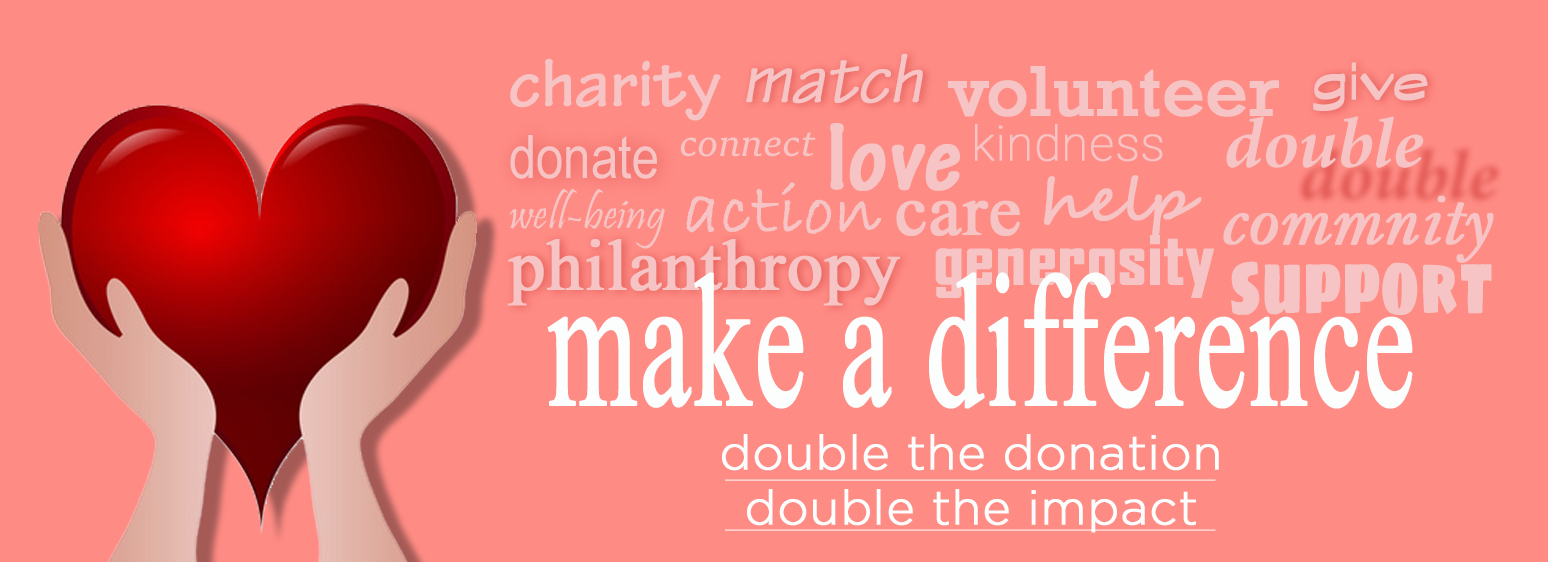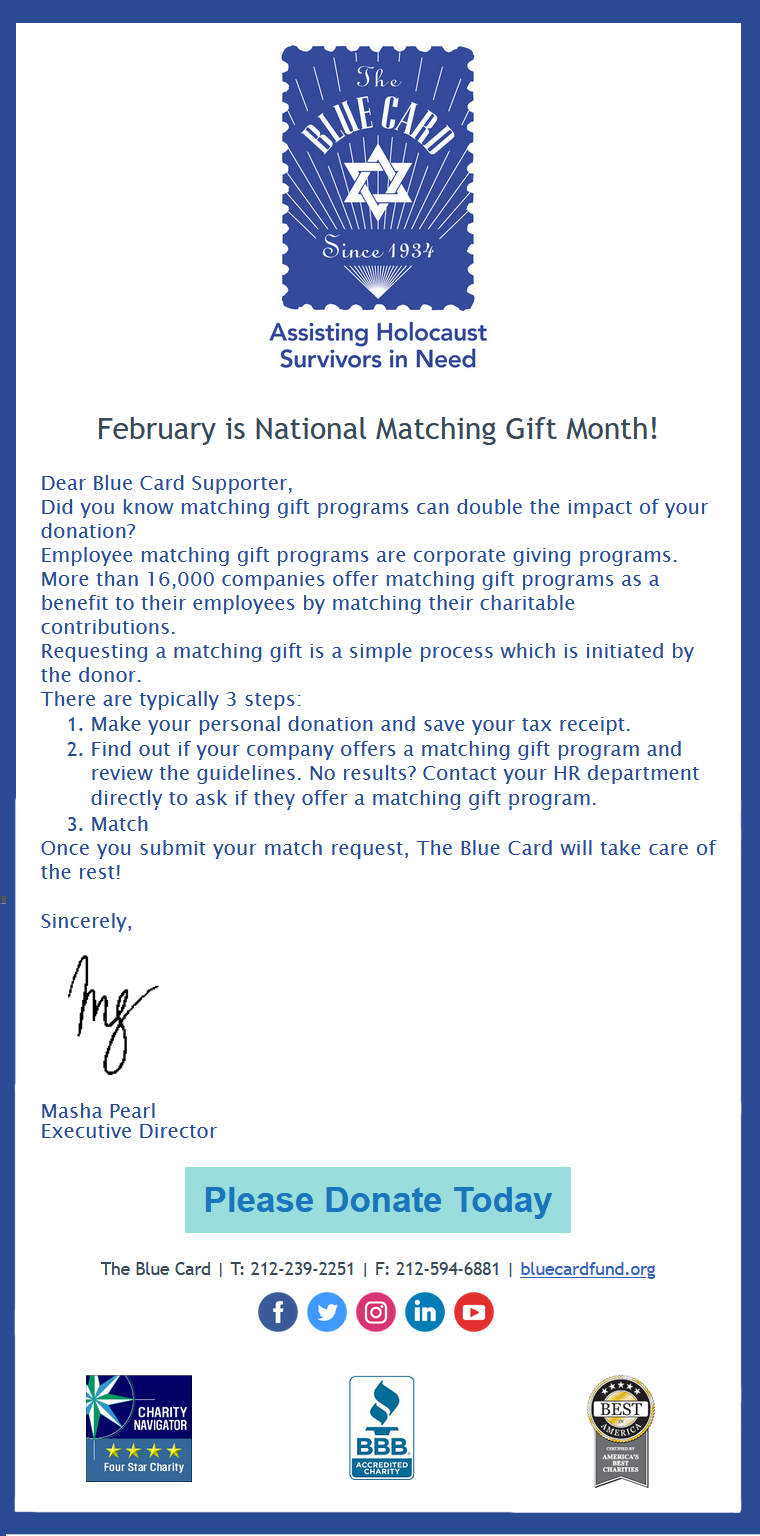Maximizing Employer Match Opportunities
Published: February 10, 2023
 by Janet Bargewell, GiveDirect Support
by Janet Bargewell, GiveDirect Support
February Is National Matching Gift Month
"Match Month" is an opportunity to recognize the impact that corporate philanthropy can have on nonprofits. February has been designated this way to increase awareness and usage of matching gift programs.
GiveDirect includes Employer Match as an optional section on every fundraising form. Are you taking full advantage of Employer Match by developing your nonprofit’s match strategy?
Keep reading and we will explore some ways you can capitalize on Employer Match.
Matching Gift Overview
What is a matching gift? One basic example of a matching donation is when an employee donates $100 to a charity, a match request is sent to the employer. The employer then "matches" the donor's gift by also donating $100, effectively doubling the donor's original contribution.
What Are the Benefits of Gift Matching?
The obvious benefit of matching gifts to the nonprofit is the organization receives double the money to advance its programs. The donor receives greater satisfaction knowing their initial investment can go twice as far in advancing their chosen cause. Lastly, the employer can improve employee morale, boost their reputation among consumers, and help meet critical community needs.
Despite the benefits, many nonprofits are still missing out on matching gift programs. On average, nonprofits receive only a bit over 1% of total contributions through employer matching gifts.
Did you know between $4 and $7 billion in potential employer matching gift revenues goes unclaimed annually? That means many employees do not ask their employers to match their donations.
These statistics show how the employer match potential is grossly underutilized.
Understanding Employer Match Programs
Before we tackle why match programs are underutilized, let's look at an employer match program from the company perspective.
Every company has its own program guidelines and definitions. Here are the most common program qualifiers.
-
Nonprofit Eligibility: Companies may limit what types of nonprofits are eligible to receive matching gifts. For example, some companies may exclude religious or political organizations from receiving matching gifts.
-
Employee Eligibility: Companies decide which employees they will accept match requests from. For example, one company may only accept matches from full-time employees while a different company may include match requests from part-time employees or even retirees.
-
Match Ratio: The rate at which the company will match a donation. For example: dollar for dollar (1:1) or 50 cents on the dollar (.5:1).
-
Gift Amount: The minimum and maximum amount the company will match per year per employee. The minimum for most companies is $25, but again, every company program is different.
-
Program Deadlines: The length of time after a donation is made that the employer will accept the match request. This is particularly important to understand for end-of-year donations.
Obstacles to Matches
The number one obstacle for donors is not being aware of their company’s matching policies. Some employees may not even know that their company offers an employer match program or that their donation is eligible. They may not know how to submit a matching gift request or they don’t understand the period within which a request must be submitted.
The second obstacle affects the charity. It takes time to build a good donor employment database: details of where your donors work, if the employer offers a matching program and what the program specifics are (match ratio, minimum gift amount, institution eligibility). Perhaps you don’t believe you have the time or staff resources to devote to collecting this data.
These are valid challenges! Let's look at some things you can do to minimize the difficulties and maximize your donors' participation.
Proactive Marketing and Strategies to Leverage Matching Gifts
Remember, many donors don't know what matching gifts are, so a bit of education is warranted.
-
Create a specific employer match donation form for your website and marketing materials. On your form, include text that highlights what employer match is - explain the benefits and how a matching donation will multiply the impact.
GiveDirect has an Employer Match donation form template. It's simple to create and easy to brand. Follow this link to get started.
-
Incorporate matching gift appeals into your campaigns to promote matching opportunities. It has been proven that donors are more likely to donate when they know their gift can be matched. It is also proven that more than half of donors who make a gift will give more when they know their donation will be matched by their employer.
If you have a large employer in your area, approach the company to see if they will run a matching gift campaign with you as part of their corporate support for your cause.
-
Collect employment data on your general donation form. Add this data to your donor's contact record in your CRM or donor database. Use the data to personalize your marketing messages about matching gifts by mentioning the donor's employer by name or linking to the employer's web site page for its matching gift program.
Employer information can also be used when the time comes to search out corporate sponsors for your next fundraising event.
With GiveDirect custom fields, it's easy to add a field to your donation page to collect employment data. GiveDirect gives you up to 9 custom fields with every form. Click here to learn more.
-
Adopt a multichannel approach to marketing. This is applicable to all programs, but especially employer match since it has such great potential to increase revenues.
- Talk about matching gifts on your web site, in your newsletter, and on social media.
- Write a storytelling piece about how a matching gift made a difference.
- If you have a major employer in your area, take the time to learn about that employer's matching program so you can walk a donor through the company's program.
- Highlight an employer in your blog, or give a shoutout of the donation amounts a particular company matched in a given period.
-
Use email marketing to promote your campaign. Here is an example of what Blue Card sent to their donor base to encourage giving for "National Matching Gift Month." Great job Blue Card!

-
Register with the CSR platforms. If your nonprofit is registered and verified with the top CSR (Corporate Social Responsibility) platforms, you will greatly increase your chances of a successful match donation. Many corporations are using one of the CSR platforms to manage their employer match program.
This one step may be the most important employer match strategy you can take.
Read our article "Steps to Register with CSR Platforms" for more information on what a CSR is, how it can help your nonprofit, and registration tips for top CSR Platforms.
Summing It Up
There are many ways to incorporate matching gifts into your fundraising strategy. Whether you are a small or large nonprofit, use the platforms you already have to educate your supporters about matching gifts. This will both encourage them to submit a match request and help make a bigger impact with their gift. Don't miss out!